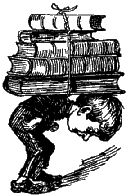A number of textbooks on
academic research and writing are available in university libraries,
public libraries, and bookstores. The following list provides some
examples. No single book provides all the answers. I encourage students
to review several texts for useful strategies and perspectives. If you
are a graduate student, it is a good idea to ask professors in your own
field of specialization about the research and writing manuals they
consider especially useful.
The Publication Manual of the American Psychological Association will prove to be a good investment for Education students. For others, The Chicago Manual of Style, Modern Language Association (MLA) Handbook, or the
Turabian Manual for Writers of Term Papers, Theses and Dissertations will be most appropriate. Writing conventions change periodically, so be sure to refer to the most recent edition of publication and writing guides.
In addition to texts on academic research and writing, I have also included a few "how-to" texts on time management and getting organized. Every stage of post-secondary education places special demands on the learner. It seems to me that one o
f the key challenges of academic life involves coping with complexity. Encountering new ideas and information can be a source of great satisfaction, but dealing with the articles, papers, notes, clippings, disks, files, books, and other material manifest
ations of one's rapidly expanding knowledge base can be overwhelming. The texts listed below may not only help you improve your
writing, but may also help you find more time to write.
Becker, H. (1998). Tricks of the Trade: How to Think about Your Research While You're Doing It (Chicago Guides to Writing, Editing, and Publishing). Chicago, IL: University of Chicago.
Becker, H. S. (1986). Writing for social scientists: How
to start and finish your thesis, book, or article. Chicago,
IL: University of Chicago.
Cone, J. D. & Foster, J. L. (2006). Dissertations and theses from start
to finish: Psychology and related fields. (2nd edition). Washington, DC:
American Psychological Association.
Elbow, P. (1981). Writing with power. New York: Oxford
University.
Keyes, R. (1995). The courage to write: How writers transcend fear. New
York: Henry Holt.
Locke, L., Spiriduso, W, & Silverman, S. (2000). Proposals that work: a guide for
planning dissertations and grant proposals. Thousand Oaks:
Sage.
Marshall, K., &Rossman, G. (2006). Designing
qualitative research (4th edition). Thousand Oaks, CA: Sage.
Madsen, D. (1992). Successful dissertations and theses: a
guide to graduate students research from proposal to
completion. San Francisco: Jossey-Bass.
Mauch, J. & Park, N. (2003). Guide to successful thesis and
dissertation: a handbook for students and faculty (5th
edition). New York: CRC.
Rossman, M. H. (2002). Negotiating graduate school: a
guide for graduate students (2nd edition). Thousand Oaks, CA: Sage.
Rudestam, K. E., & Newton, R. R. (2001). Surviving your
dissertation: A comprehensive guide to content and process (2nd edition).
Thousand Oaks, CA: Sage.
Strunk, W. Jr., White, E.B., Angell, R. (1999). The elements of style (4th edition). Boston: Allyn and Bacon.
Zinsser, W. (1990). On writing well: An informal guide to
writing non-fiction. (4th edition). New York: Harper
Perennial.
Lakein, A. (1974). How to get control of your time and your
life. New York: New American Library.
Dorff, P. (1986). File...Don't pile! A proven filing system for personal and professional use. New York: St.
Martin's.
Silber, L. (2004). Organizing from the Right Side of the Brain: A Creative Approach to Getting Organized. New York: St. Martin's Griffen.
Young, P. & Jones, P. (1981). Sidetracked home executives. New York: Warner.
Clark, B., editor (1987). The academic profession:
National, disciplinary, and institutional settings.
Berkeley, CA: University of California.
Darley, J. M., Zanna, M. & Roediger, H. editors (2003). The compleat academic - A career guide (2nd edition). Washington, DC: American Psychological Association.
Deneef, A. L., Goodwin, C. D., McCrate, E. S., editors
(1988). The academic's handbook. Durham, NC: Duke
University.
Kenny, P. (1983). A handbook of public speaking for scientists and engineers. Bristol: Adam Hilger.
Lucas, C., & Murry, J. (2001). New faculty: A practical primer for beginning academics. New York: Palgrave.
Lucas, C.J. (1998). Crisis in the academy: Rethinking higher education in America. New York: St. Martin's Press.
Mihesuah, D. & Wilson, A. (2004). Indigenizing the Academy: Transforming Scholarship and Empowering Communities. Lincoln, NE: Bison Books.
Rudolph, F. (1990 [1962]). The American college and university: A history. Athens and London: University of
Georgia.
 Go to the Mind's Eye Project.
A selection of useful,
interesting scholarly links.
Go to the Mind's Eye Project.
A selection of useful,
interesting scholarly links.
 Go to Jan's Home Page.
Go to Jan's Home Page.
 Go to the Qualitative Research in Education
Home Page.
Go to the Qualitative Research in Education
Home Page.
This document was created by Jan
Armstrong on August 7, 1996.
Last update: July 31, 2006.


 Go to the Mind's Eye Project.
A selection of useful,
interesting scholarly links.
Go to the Mind's Eye Project.
A selection of useful,
interesting scholarly links. Go to Jan's Home Page.
Go to Jan's Home Page. Go to the Qualitative Research in Education
Home Page.
Go to the Qualitative Research in Education
Home Page.